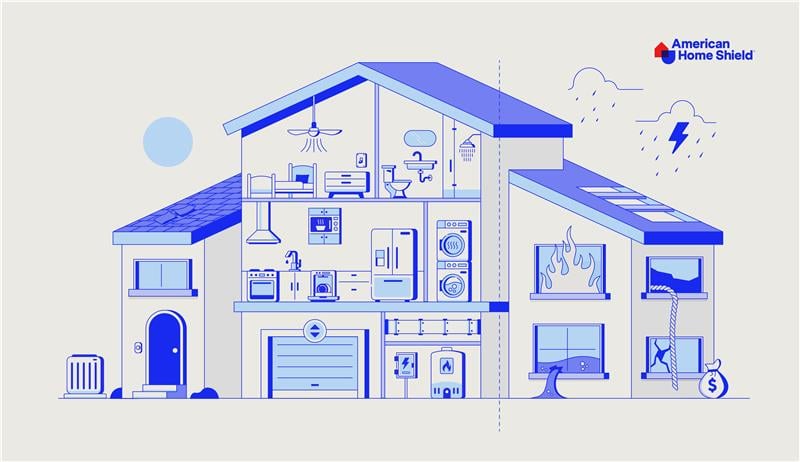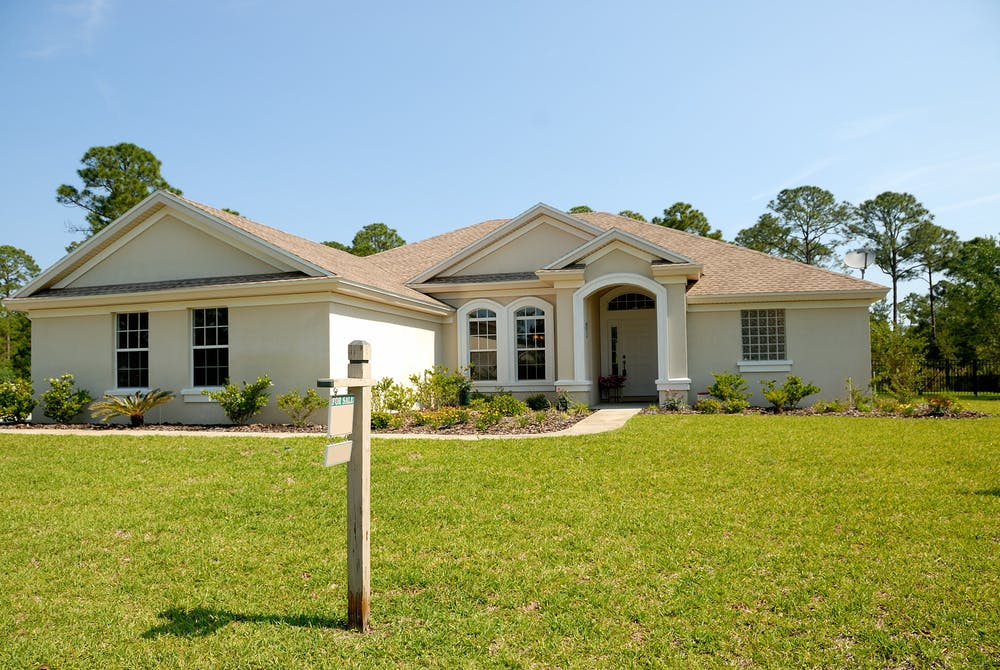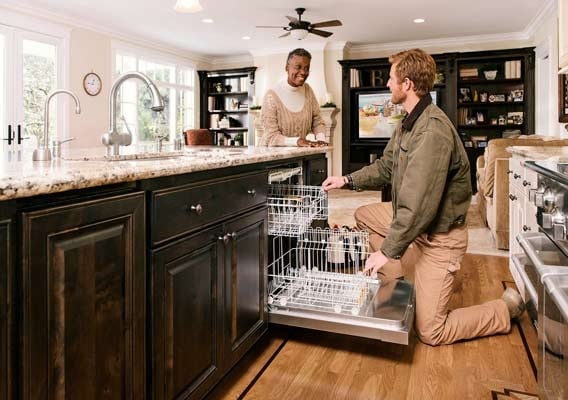
Both a home warranty and a homeowners insurance (or home insurance) are designed to protect the assets of homeowners: a home, along with its systems and appliances, are generally the most valuable assets for American families. Both coverages are designed to protect them.
Home warranties generally cover the home systems, major appliances, and some of the personal belongings (such as electronics) of homeowners while home insurance coverage is designed to cover the financial losses associated with damage or loss of a property you own.
What’s the Difference Between Homeowners Insurance and a Home Warranty?
When comparing home warranty vs home insurance, the main difference is quite simple. Homeowners insurance—or house insurance, as it’s often called—typically protects your home from events like fire, smoke, theft, fallen trees, or damage caused by weather or a natural disaster. On the other hand, a home warranty covers the breakdowns of systems and appliances due to normal wear and tear.
A home warranty plan protects your budget when covered appliances and home systems break down due to normal wear and tear. You can also check out our article on what is a home warranty to learn more.
In other words, homeowners insurance covers those events that are unlikely to happen but would often entail a great cost. This is why a home insurance premium can go up if you live in an area prone to flooding or other extreme weather events. On the other hand, home warranty companies offer peace of mind on those events that you're the most likely to experience: when appliances break, when plumbing gets clogged, or the AC stops working. In other words, home warranty coverage helps reduce the financial burden and hassle when unexpected breakdowns occur.
Home warranty coverage can potentially save you hundreds or even thousands of dollars, and it helps you avoid the headache of finding a trusted service Pro to make the repair. For American Home Shield members, a home warranty includes coverage of major components and parts of up to 23 important appliances and home systems, home maintenance services like HVAC tune-ups, and optional add-on coverage options to customize your home warranty plan. We provide plans for homeowners like you who have systems and appliances and want to avoid unexpected out-of-pocket costs.
*See the plan agreement for coverage details, including service fees, limitations and exclusions. Coverage limits and charges for non-covered items may apply.
Take a look at this side-by-side comparison of homeowners insurance vs. a home warranty.

| Home Warranty/Home Service Plan: Covers things that will happen | Homeowners Insurance: Covers things that might happen |
| HVAC Stops Working | Theft |
| Water Leaks | Fire Damage |
| Dishwasher Stops Working | Storm Damage |
| Toilet Overflows | Floods |
What is Homeowners Insurance?
Homeowners' insurance coverage typically includes any accidental damage to your home and belongings due to theft, storms, fires, and some natural disasters. There are four primary areas covered under a homeowners insurance policy:
- The interior of your home
- The exterior of your home
- Personal property in case of theft, loss, or damage
- General liability that can arise when a person is injured while on your property
How Much is Homeowners Insurance?
A home insurance policy is usually mandatory, and a bank will generally require you to obtain one before issuing a mortgage on a home. In terms of typical homeowners insurance cost, the policy is renewed yearly, and its average annual cost is roughly $1,312; though, this cost varies widely from state to state. All home insurance policies offer a deductible, which you'll pay when your claim is approved. The policy will then take care of any additional costs. Of course, you’ll want to do your research when it comes to home insurance comparisons, as different home insurance companies offer different rates and deductible requirements.
How Does Homeowners Insurance Work?
So, for instance, say you purchase homeowners insurance, and a pipe breaks and floods your kitchen. An insurance adjuster will come to your home and fill out a claim to repair or replace any damaged items in your home. Once the claim is approved, the insurance company will deduct the amount of your deductible and issue you a payment for the rest of the balance to repair your home. This deductible can also assist in lowering your yearly policy premium. The higher your deductible, the lower your yearly house insurance policy will cost. The National Association of Insurance Commissioners is a terrific resource for more information on home insurance, such as buying homeowners insurance and understanding what is not covered by homeowners insurance.
Homeowners insurance generally provides liability protection. This means that in case of third parties being affected by elements of your property (for example, a branch of one of your trees damaging a neighbor's house) your personal liability is limited and the homeowners' insurance policies can protect you.
Thinking about coverage?
Sounds like a plan. Find the warranty that fits you best.
What is a Home Warranty?
A home warranty is a 12-month service contract that provides for the repair or replacement of major components of your systems and appliances that fail due to age and standard wear and tear. For instance, a home warranty plan offers a warranty on parts of your kitchen appliances like refrigerators, dishwashers, and ovens; washer and dryer units; and major home systems such as HVAC, electrical systems, mechanical systems, and plumbing systems are all typically covered under an American Home Shield home warranty. This includes fixing them in case they break, and often covering the replacement cost if they cannot be fixed.
For more information, you can check a home warranty contract sample.
How Much is a Home Warranty?
Home warranties typically have 12-month contract terms and, unlike homeowners insurance, are not mandatory to obtain a mortgage. A home warranty is purely elective – typically coming after you have already purchased a home—but it’s a smart purchase. When considering this protection, many homeowners ask about the home warranty cost. Home warranties can be purchased for a low monthly cost, with add-on coverage for items like roof leak repair, electronic plans or pools and built-in spa equipment available for an additional cost. You can view our plans and get a free quote easily. The monthly cost for a home warranty is based on your location, the size of your home, and which plan you choose. However, our ShieldSilver plan, which covers your home systems, starts as low as a $1/day.
How Does a Home Warranty Work?
Let's say it’s the middle of the summer and your HVAC system stops working. Simply place a service request online, pay your preset service fee, and we'll assign a Pro to visit your home and diagnose the issue. If the breakdown is covered under the terms of your home warranty plan, the Pro will make the repair. If it's beyond repair, we'll replace the appliance or system component per the terms and limits in your plan agreement, for just the cost of your service fee. You get to choose the amount of your preset service fee when you purchase your home warranty plan. It's that simple!
Regardless of the differences between a home warranty and home insurance, let’s face it: life happens and things break down. Many homeowners prefer to purchase both types of policies to fully protect their homes and wallets. No matter what, American Home Shield is the most trusted home warranty company in America, with more than 2 million members, and we're here to help keep your household running smoothly.
See the plan agreement for coverage detail, including service fees, limitations, and exclusions. Coverage limits and charges for non-covered items may apply.
New Jersey Residents: The product being offered is a service contract and is separate and distinct from any product or service warranty which may be provided by the home builder or manufacturer.
AHS assumes no responsibility, and specifically disclaims all liability, for your use of any and all information contained herein.
Don't Worry. Be Warranty.
Have a plan for your home when things don't go according to plan
Shop Home Warranties

